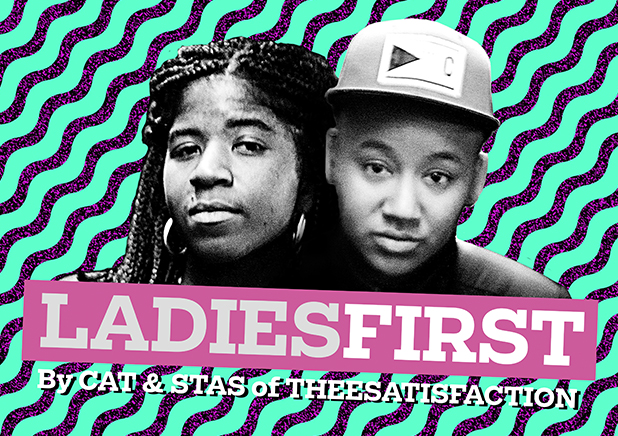Being that it’s the tail end of Women’s History Month, I decided I would share some of the women who have inspired me and my journey through their music:
TLC: Growing up in Hawaii, my older brother would send us VHS tapes (seriously dating myself here) of current music videos that were popular on the mainland. I was always excited about what each tape would introduce me to. I fondly remember the video for “Ain’t 2 Proud 2 Beg” by TLC. It blew my young black mind. Beautiful women in baggy clothing, strongly expressing themselves. They sang about getting some when they wanted it and not being afraid to pursue who they were interested in. A little advanced for my 6-year-old self, but inspiring nonetheless.
WHITNEY HOUSTON: Sometime that same year, Whitney Houston released her cover of Chaka Khan’s 1978 classic “I’m Every Woman.” Written by legends Nickolas Ashford and Valerie Simpson, the song was already a standard in my home—so to hear this funky house rendition of the tune really got my wheels turning. I couldn’t stop dancing to it. You could find me walking around singing “I’m every woman . . . CHAKA KHAN!” at any point throughout the day. The video for it was incredibly uplifting, featuring an array of women dancing and sporting all kinds of styles. Artists like TLC, Valerie Simpson, and Cissy Houston (Whitney’s mother) made cameos, but, most impactful, the clip showcased a very pregnant Whitney. I felt so empowered by that image—I learned never to question if I could be a mother and a musician.
QUEEN LATIFAH: Queen Latifah has always had a special place in my heart. Watching her switch roles from rapper to singer to actress to producer reminded me that life has no boundaries but the ones you place on yourself. Over the years she has played with many genres of music, skirting from jazz to hip-hop to house. She was and still is my vision of a fearless woman. Her character on Living Single really spoke to me. She was able to run a magazine, spend time with friends, pursue different love interests, and wear whatever she wanted. Her strong identity still inspires me.
BESSIE SMITH:
When I found out Queen Latifah would be portraying one of my favorite blues singers, Bessie Smith, for the HBO biopic Bessie, I thought it was the perfect pairing. Smith, an openly bisexual woman, was someone I stumbled across while in high school. It was hard for me around then, having had to come out about my sexuality for the millionth time—so I went searching for some sort of peace through music. While working on a research paper for one of my classes, I fatefully found Bessie Smith. A wise-crackin’, deeply profound vocalist, Smith openly spoke about her relationships with both men and women. She sang about brawling, heavy drinking, and stabbing folks, which is . . . not something I promote, but the way in which she told these stories was totally enchanting. Having been told by my music teachers that I couldn’t sing about loving women was very discouraging. They told me there wasn’t room for queer artists, so I was glad that my research proved them wrong.
ELLA FITZGERALD AND OTHER BASSY VOCALISTS:
Continuing my studies, I would look deeper into music history to find artists who had similar vocal ranges to myself. My low tenor voice was looked down upon (pun intended) by my vocal coaches. Everyone suggested I learn how to sing higher in an alto or soprano if I truly wanted to be successful or score solo parts. I needed role models to keep my head above water during that time. Relearning about artists like Ella Fitzgerald, Billie Holiday, and Sarah Vaughan saved me. I had been aware of these artists for a while, but this time around I dove into their repertoires head-first. Their ability to bend and stretch notes while expressing deep storylines kept my hope of becoming a singer alive. I would sit in my room listening to Fitzgerald’s “Take the ‘A’ Train” and “A-Tisket A-Tasket” learning all the runs and scat solos. This would eventually create my sound—I suddenly realized I wanted to be a jazz singer. The freedom that existed in the genre excited me. But I knew that sound hadn’t stopped there. I knew that somewhere there were more deep-voiced women exploring their ranges. So I asked my parents and my brother, who should I listen to? My older brother (the one who sent me those VHS tapes) suggested Brandy, Toni Braxton, and Mariah Carey. He was right on the money! I fell in love with their low, tender tones. My parents suggested Anita Baker and Patti Austin, advising I look into funk and soul. From there I got into Mavis Staples, Patrice Rushen, the Emotions, and many more. The groove came easy to me and fit my personality. Being a disco baby at heart, I felt at home with the psychedelic, gospel-inspired vibrations.
All around me, music was expanding. It seemed like there was an endless vat of resources to sort through, and I wasn’t planning on stopping. I wanted to sing with all these women and be in all these groups, dancing and harmonizing. Performing had always come natural to me, but after all this research I felt like I was truly prepared. Music is a huge part of my life; it has saved me from my lowest points and taken me to high ground. It has accentuated my happiest moments. Without these women, there wouldn’t be a SassyBlack or a THEESatisfaction—and for that I am eternally grateful.
music@seattleweekly.com




